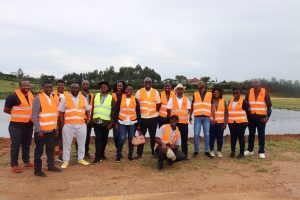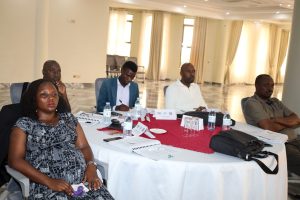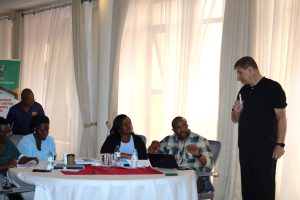Approximately 23 officials from different Ministries, Departments and Agencies (MDAs), as well as from the Civil Society have completed training in the Program on Investment Appraisal and Risk Analysis (PIAR). The trainees received training in Basic Public Investment Management (PIM), Financial and Risk Analysis and finally Economic Appraisal and Stakeholder Analysis. The training culminated in the award of Certificates jointly awarded by Makerere University, Ministry of Finance, Planning and Economic Development (MoFPED) and Cambridge Recourses International.
The two-weeks training, which took place in Mbarara attracted participants from Ministries, Agencies, Academia and the Civil Sector. Speaking during the closing ceremony, Prof. Eria Hisali, the Principal of the College of Business and Management Sciences where the PIM Centre of Excellence is hosted, said the Centre aims at creating a pool of experts who can write proposals and approve public investments.
He cautioned the public officers to clearly identify projects that can deliver economic growth and also encouraged them to work together. He said the Centre would organize an experience sharing workshop to do an M&E on all the trainees to see how effectively they are utilizing the acquired knowledge. He informed participants that the University Senate had approved the proposed PIM Masters, “Masters in Economic and Investment Modeling,” and encouraged them to apply once the program is approved by the National Council for Higher Education. He said the Centre was also in the process of drafting a Post Graduate Diploma in Public Investment Management. Prof. Hisali appreciated the Ministry of Finance, Planning, and Economic Development for providing financial support to the Centre as well as CRI and NPA for the partnership in training.

Dr. Willy Kagarura, the Centre’s manager said he was confident that the knowledge given to the participants will go a long way in ensuring they write the accurate investment proposals for the government to review.
He emphasized the importance of equipping individuals with the necessary skills to make informed investment decisions which will ultimately contribute to the economic development of the Country. Dr. Willy also highlighted the practical nature of the training, ensuring that participants are well-prepared for real-world scenarios in investment modeling.
Ms. Gertrude Aerone Basiima, the Assistant Commissioner of the Project Analysis and Public Investment Department emphasized the importance of the training, saying the goal of a project appraisal is to prevent bad projects from going ahead and good projects from being rejected. “This training is therefore aimed at ensuring that all stakeholders including Public Officials, Private Sector and Civil Society analysts develop and appraise investment projects in order to promote the economic and social wellbeing of the country,” she said.

She said the training arose out of the needs assessment that identified critical gaps by Officers in different MDAs with regard to undertaking Cost Benefit Analysis, Cost Effectiveness Analysis, preparation and cross-examination of pre-feasibility and feasibility studies.
“I hope that the training you have attained during the last 3 training sessions has equipped you with skills to conduct and review feasibility studies by putting into considerations the different perspectives of Banker/Lender, Project Owner, Country and Distribution of Externalities. While you are undertaking project development and appraisal, please remember these perspectives,” Ms Basiima said. Ms Basiima emphasized the importance of considering various perspectives during project development and appraisal to ensure a comprehensive feasibility study. She encouraged participants to apply the skills acquired in the training sessions to conduct thorough analyses and make informed decisions.
She further appreciated the dedicated faculty team comprised of CRI resource persons, Hassan and Christiania. The Ugandan Faculty consisting of Dr. Willy Kagarura, Prof. Edward Bbaale, Dr. John Sseruyage, Dr. Vincent Ssajjabi, Dr. Ibrahim Mike Okumu, Dr Ibrahim Mukisa, and Mr. Edwin Sentumbwe from Makerere University PIM CoE, Mr. Musimeta Hannington from NPA and, Mr. Ahaisibwe Joseph and herself from MoFPED

On his part, Mr. Hannington Musimenta, one of the faculty members from the National Planning Authority, emphasized the importance of the study, saying the NDPIII evaluation showed that the Country performed only to the tune of 17% because of poor projects. With this training and knowledge acquired by the different public officers, he was positive that the implementation of projects in NDP IV would be more successful and impactful leading to greater development outcomes for Uganda.
As part of the training, the team visited one government project in Kiruhura and Mbarara District titled the Reconstruction of Kyeshema Earth Dam. The dam was reconstructed to supply water to the cattle corridor during the dry seasons. The participants were able to evaluate a real-world project in relation to the theory obtained during training.
The training was opened on April 22, 2024, by the Director of the PIM Centre of Excellence, Prof. Edward Bbaale, who called on the trainees to fully engage in the training sessions and actively participate in discussions to maximize their learning experience. He emphasized the importance of applying the knowledge gained to their work in order to achieve tangible results and make a difference in their workplaces.
The director also highlighted the significance of networking and collaboration among participants, as this would foster a supportive environment for sharing best practices and innovative ideas. “By fostering a culture of continuous learning and knowledge exchange, the training program aims to empower individuals to drive sustainable development in Uganda”. He appreciated the MoFPED for the financing of the training and the nomination of the right people to train. The director emphasized the importance of participants actively engaging in discussions and practical exercises during the training sessions to maximize their learning experience. Additionally, he encouraged participants to take advantage of the resources and support provided by the program to implement their new skills and knowledge effectively in their respective roles.

